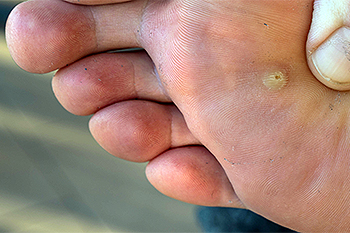Painful Plantar Warts

Despite the fact that plantar warts are harmless skin growths, they can produce severe pain. They grow inward and can produce discomfort as pressure is exerted while walking. They are considered to be contagious and may spread to other areas of the foot. Plantar warts can develop from exposure to a specific type of fungus, which is found in warm and moist environments. These can include public swimming pools, locker rooms, and similar areas. It is important to refrain from sharing towels, shoes and socks, and this may help to prevent the spread of plantar warts. Many people choose to seek relief from using over the counter remedies, despite this being a temporary fix. If you have a plantar wart, it is suggested that you speak with a podiatrist who can offer a more permanent solution, which may include minor surgery for removal.
Plantar warts can be very uncomfortable. If you need your feet checked, contact Vincent, Vess from Fourth River Foot & Ankle. Our doctor will assist you with all of your foot and ankle needs.
About Plantar Warts
Plantar warts are the result of HPV, or human papillomavirus, getting into open wounds on the feet. They are mostly found on the heels or balls of the feet.
While plantar warts are generally harmless, those experiencing excessive pain or those suffering from diabetes or a compromised immune system require immediate medical care. Plantar warts are easily diagnosed, usually through scraping off a bit of rough skin or by getting a biopsy.
Symptoms
- Lesions on the bottom of your feet, usually rough and grainy
- Hard or thick callused spots
- Wart seeds, which are small clotted blood vessels that look like little black spots
- Pain, discomfort, or tenderness of your feet when walking or standing
Treatment
- Freezing
- Electric tool removal
- Laser Treatment
- Topical Creams (prescription only)
- Over-the-counter medications
To help prevent developing plantar warts, avoid walking barefoot over abrasive surfaces that can cause cuts or wounds for HPV to get into. Avoiding direct contact with other warts, as well as not picking or rubbing existing warts, can help prevent the further spread of plantar warts. However, if you think you have developed plantar warts, speak to your podiatrist. He or she can diagnose the warts on your feet and recommend the appropriate treatment options.
If you have any questions please feel free to contact our offices located in Pittsburgh, White Oak, and McKeesport,PA . We offer the newest diagnostic and treatment technologies for all your foot and ankle needs.
